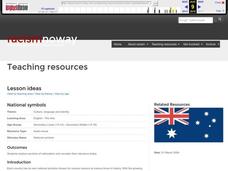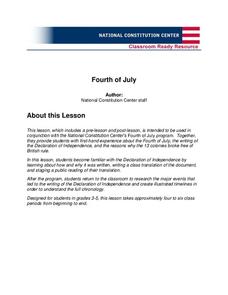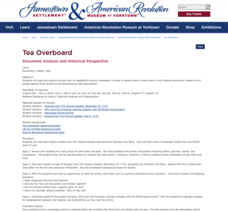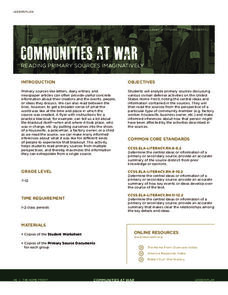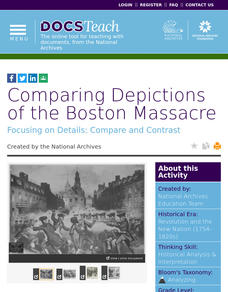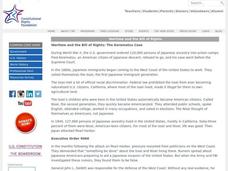Curated OER
Nothing But the Truth: Anticipation Guide
“What does it mean to be patriotic?” “Should grades factor in to a student’s eligibility for extracurricular activities?” Class members complete an anticipation guide that asks them to respond to a series of statements that highlight...
Stanford University
Boston Massacre
The Boston Massacre was a propaganda victory for those protesting British rule over the American colonies. By using images from Patriots, as well as the testimony of witnesses, scholars consider what may have happened on that fateful day...
Los Angeles Unified School District
Why Is the Declaration of Independence Important?
Fair or unfair? To begin a study of the American Revolution, class members review the treatment of the people of the American Colonies by the King of England and decide which were fair and which were unfair. Class members then annotate a...
Curated OER
Mixed Blessings
Students investigate the recent federal appeals court decision finding the Pledge of Allegiance unconstitutional. They further investigate the notions of constitutionality and separation between church and state by analyzing a patriotic...
Curated OER
National Symbols
Students explore symbols of nationalism and consider their relevance today. Students listen to national anthems of various countries, discuss sentiments that songs and lyrics invoke, research history of anthems and countries they...
National Park Service
Making Choices
What factors go into a decision to enter a war? Use a collection of primary source documents and images to prompt a discussion about the American Revolution and the reasons for entering a war against Britain.
National Constitution Center
Fourth of July (Grades 3-5)
Bring history to life for your young scholars with a Fourth of July lesson series. After a class reading of the Declaration of Independence, students translate this pivotal document into layman's terms before working in small groups to...
DocsTeach
To Sign or Not to Sign
To sign or not to sign, that is the question. Scholars review the Declaration of Independence and discuss the Framers' decisions for signing the document. The activity uses primary text, a worksheet, and group discussion to help...
DocsTeach
Memorials, Statues, and Monuments to George Washington
An activity uses images of George Washington's statues to compare how they represent different aspects of his life. Scholars complete a worksheet based on their findings and then share as a group how they would construct a new memorial...
Jamestown-Yorktown Foundation
Life of a Private Lesson Plan
In order to understand the challenges the Continental Army faced during the American Revolution, class members analyze primary source materials including a soldier's journal and an officer's letter, and watch a short reenactment video.
Jamestown-Yorktown Foundation
Tea Overboard
While less well known than the event in Boston, the Yorktown Tea Party was equally decisive in turning community sentiment against Great Britain. To gain an understanding of why the colonists objected to the Tea Act, young historians...
Pace University
American Revolution
Young historians get hooked into a unit study of the American Revolution with a simulation that lets them experience some of the outrage colonists felt about unfair taxes. Class members demonstrate what they have learned in the study by...
National WWII Museum
Communities at War: Reading Primary Sources Imaginatively
Uncle Sam wants you to support the troops. Learners use an engaging lesson plan to analyze primary and secondary sources to discover what life was really like for American citizens at home during WWII. Pupils complete worksheets, group...
DocsTeach
Comparing Depictions of the Boston Massacre
Academics compare images of the Boston Massacre to understand differing opinions of the event. Scholars view multiple images, participate in group discussion, and complete a series of written prompts. Young historians gain an...
Digital Public Library of America
African American Soldiers in World War I
Finding good primary source materials to support any study of history can be a challenge and time-consuming. A set of 11 primary source letters, images, and text excerpts provide young historians with an opportunity to sharpen their...
Center for History Education
How Did the Public View Women’s Contributions to the Revolutionary War Effort?
Calling upon the legacies of Joan of Arc, Elizabeth I, and Catherine the Great, Esther Reed rallied Southern women to support the American Revolution. Using a broadside by Reed and other primary sources, such as poetry, young historians...
Franklin D. Roosevelt Presidential Library & Museum
The Power of Propaganda in Shaping Civic Actions and Understanding
Propaganda posters are powerful. Using images from The Art of War: American Poster Art 1941-1945 exhibit, young historians analyze the symbols, images, colors, and text used to rally support for World War II. Through seven activities,...
Curated OER
Making Cents of Independence
Learners explore the causes and major events of the Texan and American revolutions. Comparisons and contrasts are made between the two revolutionary experiences and applied to the symbolism used on the Texas State quarter.
Curated OER
(Texas) Capitol Visitors Center, Pre-Visit Lesson Plan, Grades K-3
Young scholars examine pictures of the four flags Texas had had through history. They discuss similarities among the flags and they relate the flag as a patriotic symbol of Texas. Then they create their own flag incorporating a Lone...
Curated OER
In the Lead
Students reflect upon questions of guilt and hatred in context of Holocaust, and compare/contrast meaning of loyalty or patriotism during Holocaust and today.
Jamestown-Yorktown Foundation
Why Did Some Colonial Virginians Continue to Support the King?
Not all colonials supported the American Revolution. A resource from the American Revolution Museum at Yorktown ask young historians to investigate the reasons why some colonial Virginians were loyalist and continued to support King...
Curated OER
Art and Patriotic Culture
Art forms, especially government-sponsored "poster art", very effectively conveyed specific cultural values during World War II. Understanding the role that visual images play in expressing issues and ideas is critical to developing...
Curated OER
Wartime and the Bill of Rights: The Korematsu Case
Students examine the balance between civil liberties and protection. In this national security lesson, students explore the Korematsu case which references the Japanese internment camps of World War II. Students draw comparisons between...
Curated OER
Local Mobilization for War
Tenth graders analyze how government policies led to complete concentration in war effort, evaluate how patriotism was encouraged by many local and state groups, and discuss fate of Japanese Americans.
Other popular searches
- Kindergarten Patriotism
- Essays About Patriotism
- Patriotism Preschool
- Art Lesson Plans Patriotism
- Anthems and Patriotism
- American Patriotism
- Patriotism Art
- Patriotism Lesson Plans
- Patriotism and Music
- Pitching Patriotism
- Jamestown Patriotism
- Essays About Patriotism I






